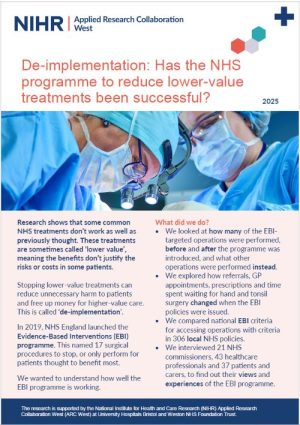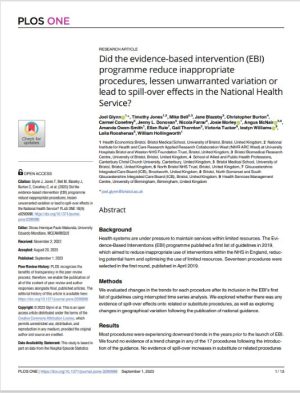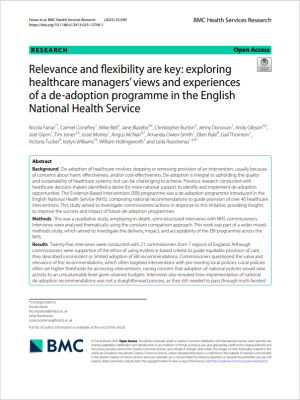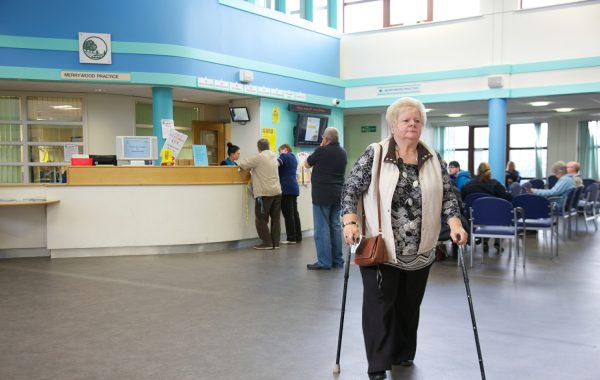De-implementation: Has the NHS programme to reduce lower-value treatments been successful?
Research shows that some common NHS treatments don’t work as well as previously thought. These treatments are sometimes called ‘lower value’, meaning the benefits don’t justify the risks or costs in some patients.
Stopping lower-value treatments can reduce unnecessary harm to patients and free up money for higher-value care. Stopping or reducing a treatment in the NHS is called ‘de-implementation’. De-implementation could mean stopping a treatment altogether, or only giving it to patients who are most likely to benefit.
In 2019, NHS England launched the Evidence-Based Interventions (EBI) programme. In the first ‘wave’, this named 17 surgical procedures that NHS commissioners must stop funding, or only fund for those patients that are thought to benefit the most.
The OLIVIA project is investigating whether the EBI programme is working as expected. It is funded by a National Institute for Health and Care Research (NIHR) grant.
Project aims
We wanted to understand the impact of the EBI programme, how it’s being rolled out and if it’s acceptable to clinicians, healthcare commissioners and patients. We’ll then make recommendations for future programmes that aim to reduce lower-value care.
What we did
- We evaluated changes in NHS care before and after the EBI policies were issued. We explored how many of the EBI-targeted procedures were performed, and what other procedures were performed instead.
- We assessed whether the EBI policies reduced variations in access to the targeted procedures between different areas of the country.
- For hand and tonsil surgery, we explored how referrals, GP appointments, prescriptions and time spent waiting for operations changed before and after the EBI policies were issued.
- We compared the criteria for accessing EBI-targeted procedures in 306 local NHS commissioning policies, with the criteria stated in the national EBI policies.
- We surveyed NHS commissioners (professionals responsible for planning and funding healthcare regionally) across England to find out how they responded to the EBI programme.
- We interviewed 21 NHS commissioners from 7 regions of England, to find out their views and experiences of the EBI programme.
- We interviewed 43 healthcare professionals from five different healthcare specialities: ear, nose and throat surgery, orthopaedics (bone and muscle surgery), plastic surgery and hand surgery, general surgery, and urology (kidney, bladder and prostate surgery).
- We interviewed 37 patients and carers whose care might have been affected by EBI policies to explore their experiences of care. We also collected recordings of hospital consultations to understand the ways in which information is communicated to patients, in relation to decision-making in the context of the EBI programme.
What we found and what this means
Changes in the number of lower-value operations
We found that the numbers of most procedures targeted in the first wave of the EBI programme was already decreasing before the programme was introduced. This decrease continued in the same way after it was introduced. We also found that variations in access to the procedures in different areas of the country didn’t change after the programme was introduced.
These findings show that the first wave of the EBI programme didn’t appear to be successful in reducing the number of lower-value procedures being performed, and didn’t change variation in access to these procedures across the country.
Healthcare commissioners’ responses to the EBI programme
In comparing local and national policies, we found that less than half of local NHS commissioning policies matched EBI recommendations. The most common sources of differences related to the way in which underlying conditions were diagnosed, how bad symptoms needed to be and how quicky the condition was progressing.
Our interviews with commissioners shed light on the reasons why the national EBI policies had been inconsistently, or partially, adopted.
Although commissioners were supportive of the EBI programme’s overall aims, they didn’t always feel able to adopt the EBI policies due to concerns about cost implications and the practicalities of changing their existing local policies. Some reflected that adopting EBI policies risked increasing the number of procedures they performed, or costs, in cases where their pre-existing local policies for accessing the targeted procedures were stricter.
Commissioners questioned the value of recommendations which targeted procedures that already had local policies in place. We also found that it can be difficult to adopt national policies like those arising from the EBI programme, due to a complex and time-consuming local approvals process.
Based on our findings, we recommend that national de-adoption programmes provide guidance around how local policymakers should reconcile national recommendations with local policymaking processes.
Case study: hand surgery
From interviews with patients, we learned that, in the case of Dupuytren’s contracture release (a type of hand surgery), de-implementation was generally acceptable when:
- It included education around the reasons for withholding surgery
- There were clear instructions about when to consult a healthcare professional again
- Consistent and comprehensive information was provided to patients at all stages of their care
From interviews with healthcare professionals, we found that they generally agreed with the EBI recommendations for the type of surgery they conducted. On the other hand, there were concerns that a lack of flexibility in the implementation of these recommendations could impact individualised care.
From analysis of hospital consultations, we learned that healthcare professionals used EBI criteria as a threshold to offer Dupuytren’s contracture release to patients, though they rarely mentioned the EBI policies during the consultations.
Our findings show that de-implementation policies can be acceptable to patients in some contexts. However, it is important to consider how these policies are implemented.
What next?
We discussed our findings in a workshop attended by 40 commissioners, healthcare professionals and public contributors from around the country. Based on the workshop discussions we produced 10 recommendations to improve future de-implementation efforts.
We are also running a follow-on study examining how Integrated Care Systems are developing and delivering de-implementation plans. We will share examples of good practice, and identify areas where there is a need for further guidance and support for local and regional healthcare planners and practitioners, in a workshop.
If you are a member of an Integrated Care System and would like to contribute to the above project and/or attend the final workshop, please contact Leila Rooshenas or Carmel Conefrey.
ARC BITE

De-implementation: Has the NHS programme to reduce lower-value treatments been successful?
Download the BITEPapers

Did the evidence-based intervention (EBI) programme reduce inappropriate procedures, lessen unwarranted variation or lead to spill-over effects in the National Health Service?
Read the paper
Relevance and flexibility are key: exploring healthcare managers' views and experiences of a de-adoption programme in the English National Health Service
Read the paperRelated research
This project builds on the work of these earlier studies.
Lead collaborators
- Dr Leila Rooshenas, University of Bristol
- Dr Amanda Owen-Smith, University of Bristol
- Dr Iestyn Williams, University of Birmingham
- Gail Thornton, public contributor
- Victoria Tucker, Bristol, North Somerset and South Gloucestershire Integrated Care Board
- Professor Christopher Burton, Canterbury Christ Church University
- Professor Jane Blazeby, University of Bristol
- Professor Jenny Donovan, University of Bristol
- Carmel Conefrey, University of Bristol
- Joel Glynn, University of Bristol
- Nicola Farrar, University of Bristol
- Timothy Jones, University of Bristol
ARC West Staff
Dr Andy Gibson
Patient and Public Involvement LeadJosie Morley
PhD studentPartners on this project
Bristol, North Somerset and South Gloucestershire Integrated Care Board
The Integrated Care Board (ICB) is responsible for the day-to-day running of the NHS. The NHS Bristol, North Somerset and South Gloucestershire ICB takes account of population needs, arranges for the provision of services and manages the NHS budget.
University of Bristol
The University of Bristol is internationally renowned and one of the very best in the UK, due to its outstanding teaching and research, its superb facilities and highly talented students and staff. Its students thrive in a rich academic environment which is informed by world-leading research. It hosts the Elizabeth Blackwell Institute for Health Research.



